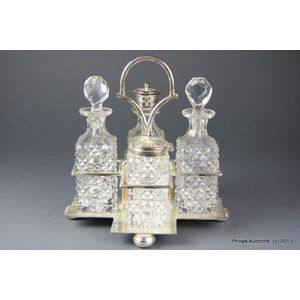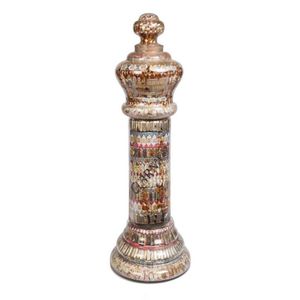Octagonal Silver Sugar Casters, London 1721-22
You must be a subscriber, and be logged in to view price and dealer details.
Subscribe Now to view actual auction price for this item
When you subscribe, you have the option of setting the currency in which to display prices to $Au, $US, $NZ or Stg.
- Sterling Silver - Sterling silver is a mixture of 92.5% pure silver and 7.5% of another metal, usually copper. Fine silver is 99.9% pure silver, and is relatively soft and the addition of the very small amount of copper gives the metal enough strength and hardness to be worked into jewellery, decorative and household objects.
- Anthemion - An anthemion is a classical decorative design element based on the acanthus flower that consists of a central circular or oval motif surrounded by radiating petals or leaves. It is often used as a border or frieze in architecture, furniture, and other decorative arts. The anthemion is derived from the palmette, a motif that was popular in ancient Greek and Roman art and architecture. It is often associated with the classical world and with Neoclassical style, and it is often used to add a sense of grandeur and formality to a design. The anthemion is also known as a honeysuckle or honeysuckle ornament. It continues to be used in a variety of contexts today, and it is often admired for its elegant and decorative qualities.
- Hallmarks - A mark stamped on articles of precious metals in Britain, since the 14th century, certifying their purity. It derives its name from the Guild Hall of the Goldsmiths' Company, who recieved its Charter in 1327 giving it the power to assay (test the purity) and mark articles of gold and silver.
The hallmark will consist of several marks, including the:
- silver standard mark, indicating the purity of the metal. Sterling silver is .925 pure silver.
- the city mark indicating the city in which it was assayed eg London, Birmingham, York etc.
- the date mark, usually a letter of the alphabet in a particular font and case,
- a duty mark, indicating whether duty had been paid to the crown, and only in use from 1784 to 1890
The piece may include an additional mark, the maker's mark, although not forming part of the hallmark, will be located in the vicinity of the hallmarks.
Sometimes silver plated items will bear faux hallmarks, often confusing those not familiar with silver markings. - Finial - An architectural decoration, found on the upper parts of of an object. On furniture they are usually found on pediments, canopies and shelf supports. On smaller ceramic or silver items, such as spoons, they may decorate the top of the item itself, or the lid or cover where they provide a useful handle for removal.
Finials have a variety of shapes and forms. They may be urn-shaped, baluster shaped round or spiral, but usually taper into an upper point. Many real life shapes may also be used as finials, such as pineapples, berries, pinecones, buds, lotus and acorns. Sometimes animals such as a lion are depicted, or fish and dolphins. - Engraving - The method of decorating or creating inscriptions on silver and other metal objects by marking the surface with a sharp instrument such as a diamond point or rotating cutting wheel.
This item has been included into following indexes:
Visually similar items

An Edwardian silverplate cruet set, Sheffield, early 20th century, with maker's mark for Walker & Hall, number 5956. a four piece set comprising two vinaigrettes with faceted stoppers, a pepper pot and a salt shaker, all of rectangular form with a diamond

Pair hallmarked Georgian snuffers, Hallmarked Birmingham 1813

Four perfume bottles with silver lids (4)

A rare late Victorian Clarnico Sweets glass confectionary stand, with original confectionary, signed Clarnico, 107 cm
